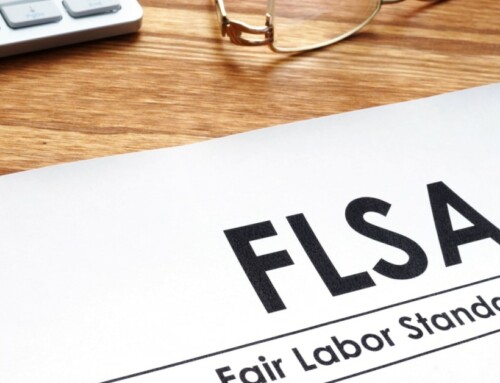The U.S. Department of Labor (DOL) has proposed significant changes to the white-collar exemptions under the Fair Labor Standards Act (FLSA). While these changes are not yet final, employers in South Carolina should consider their implications for the future and ensure that they are prepared to comply if and when necessary.
Most significantly, the DOL’s Notice of Proposed Rulemaking (NPRM), Defining and Delimiting the Exemptions for Executive, Administrative, Professional, Outside Sales, and Computer Employees, revises the current salary level for exempting overtime pay to executive, administrative, and professional employees. It also seeks to implement an automatic updating mechanism based on then-current earnings data for the future. As the DOL issued the NPRM on September 8, 2023, the 60-day comment period closed on November 7, 2023. If adopted, the final NPRM will likely take effect sometime in mid-2024—setting aside the possibility of any legal challenges that may delay its implementation.
DOL Seeks to Guarantee Overtime Pay for Most Salaried Workers Earning Less Than $55,068 Per Year
The thrust behind the DOL’s proposed changes to the FLSA’s overtime exemption is a desire to “restore and extend overtime protections for low-paid salaried workers.” As the DOL explains in a press release announcing the NPRM:
“Many low-paid salaried employees work side-by-side with hourly employees, doing the same tasks and often working over 40 hours weekly. But because of outdated and out-of-sync rules, these low-paid salaried workers aren’t paid time-and-a-half for hours worked over 40 a week. The department’s proposed salary level would help ensure that more of these low-paid salaried workers receive overtime protections traditionally provided by the department’s rules.”
In addition to raising the current exemption level for overtime, the DOL’s NPRM also seeks to “better identify[] which employees are executive, administrative or professional employees who should be overtime exempt,” as well as updating the salary level for the exemption every three years.
If adopted in its current form, the DOL’s NPRM would guarantee overtime pay for salaried workers earning less than $55,068 per year. As the DOL notes in a set of FAQs issued alongside its press release, the current salary threshold of $35,568 has been in place since January 1, 2020. According to DOL data, “salaried workers in the U.S. economy have experienced a rapid growth in their nominal wages, which lessens the effectiveness of the current salary level threshold.”
The salary threshold establishes the base salary for white-collar workers to be exempted from overtime pay. Otherwise, exempt employees who earn less than $35,568 per Year ($684 per week) are entitled to overtime pay when they work more than 40 hours in a workweek, as defined by the FLSA. If adopted, the DOL’s proposed rule would increase this threshold to $55,068 per Year ($1,059 per week)—which, according to the DOL, would result in an additional 3.4 million workers being entitled to overtime pay.
The NPRM also proposes increasing the highly compensated employee (HCE) exemption from $107,432 to $143,988, representing the current 85th percentile of full-time salaried workers nationally. Similar to most white-collar workers. HCEs are not eligible for overtime. To qualify as an HCE, an employee must: (i) earn a salary above the exemption level; (ii) have primary duties that include performing office or non-manual work, and (iii) “customarily and regularly” perform at least one of the exempt duties or responsibilities of an EAP.
The salary threshold increase would not affect all exempt employees. As the DOL explains in its FAQs, “There is no salary level test required to qualify as an exempt outside sales employee[ and certain professionals including doctors, lawyers, and teachers are also not subject to the salary test[].” This would not change under the DOL’s proposed rule.
The Impacts of the DOL’s Proposed Rule for Employers in South Carolina
If the DOL’s proposed rule becomes final, what would this mean for employers in South Carolina? The DOL estimates that during the first year the revised law is in effect, employers will experience $1.2 billion in direct costs nationally. This includes an estimated “$427.2 million in regulatory familiarization costs, $240.8 million in adjustment costs, and $534.9 million in managerial costs.” The DOL also suggests employers will experience increased worker productivity and reduced employee turnover. However, it does not explain why or provide data to support these assertions.
The DOL also indicates that its proposed changes to the FLSA’s overtime exemption rules for white-collar employees “could reduce the risk of misclassification.” Misclassification occurs when an employer improperly characterizes an employee as exempt under the FLSA’s overtime rules. Misclassifying employees leads to liability for back pay and other damages through DOL enforcement actions or private litigation. If the proposed rule becomes final, employers must continue to be cautious to ensure they do not run afoul of the revised FLSA classification requirements.
For now, employers in South Carolinas should ensure they comply with the current FLSA standards for employee classification and overtime pay. This will not only help mitigate employers’ risks in the short term but also help facilitate compliance with the DOL’s revised standards should they take effect in 2024. Employers should also begin looking at the salary levels of their exempt employees so they can consider whether to increase salaries or allow such employees to be eligible for overtime.
Speak with an Employment Lawyer at Gignilliat, Savitz & Bettis LLP
If you have questions about how the federal overtime and employee classification rules apply to your company, we invite you to contact us. Gignilliat, Savitz & Bettis LLP is an employment law firm in Columbia, SC, that exclusively represents employers. To speak with one of our employment lawyers confidently, please call 803-799-9311 or request an appointment online today.






